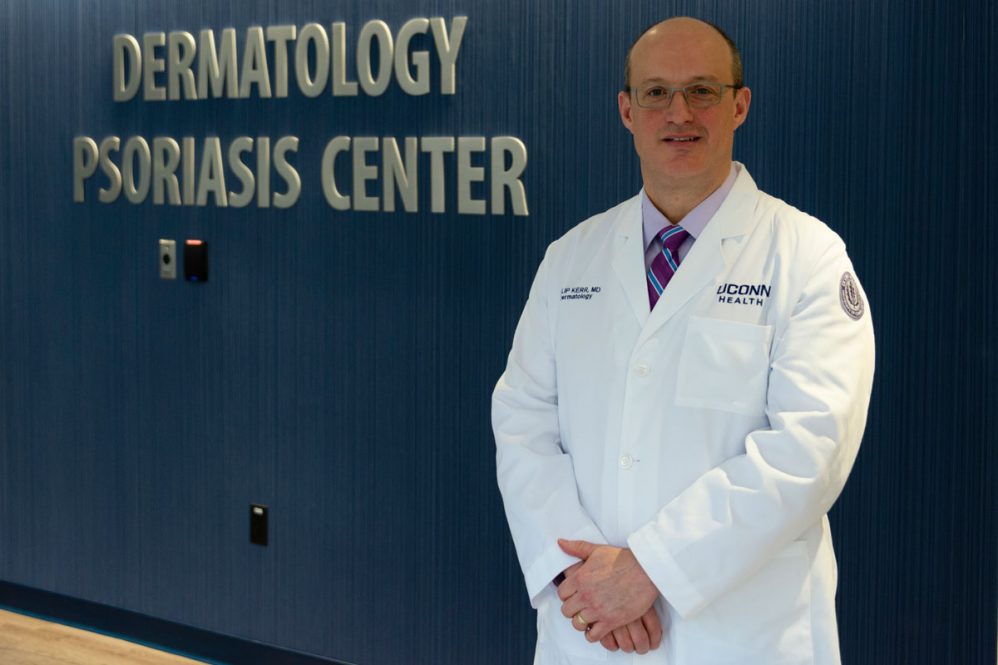As innovations in the treatment of psoriasis continue to evolve, UConn Health now has a dedicated psoriasis center within its dermatology practice.
Psoriasis is a relatively common condition in which an abnormality in the immune system leads to scaly, itchy, and sometimes painful skin plaques.
“Living with psoriasis, I think you’re always looking for someone who can help you and try to make it better,” says Elizabeth, who’s in her late 50s and was first diagnosed with psoriasis at age 17. “I think you are always trying to chase a cure for it, but rarely is the emotional impact it has on you addressed.”
While UConn Health dermatologists always have treated psoriasis, the new center, which opened this week in the former emergency department space in the Connecticut Tower, represents a coordinated and holistic approach to providing care for those with psoriasis, who make up an estimated 25-to-30% of UConn Health’s dermatology patients.

“The psoriasis center consists of a core group of physicians and nurses who know the psoriasis patients well and have extensive experience managing them,” says Dr. Marti Rothe, one of the UConn Health dermatologists who specialize in psoriasis care. “Having this therapeutic relationship centered in a single area will enable seamless communication between providers so that they can all remain updated on management plans and progress for each patient.”
A longer-term objective is to introduce a virtual psoriasis patient education group, offering insights about disease management in areas such as nutrition, lifestyle medicine, pediatric psoriasis, and psoriatic arthritis. Bethany Cucka, a third-year student at the UConn School of Medicine, is launching the program, with the first webinar taking place March 31 at 6 p.m.
“Psoriasis can be a systemic inflammatory condition and may increase the risk for other medical diseases,” Rothe says. “Patients with psoriasis, especially those with moderate and severe forms, are at a higher risk of developing cardiovascular disease, diabetes mellitus, fatty liver, psoriatic arthritis, and inflammatory bowel disease. Psoriasis can also be overwhelming and stressful for patients and may place them at risk for mental health conditions, such as anxiety and depression.”
Elizabeth, who’s been Rothe’s patient for more than a decade, recalls some of those challenges, particularly as a young adult.
“I couldn’t go anywhere where somebody didn’t stop me and say, ‘Oh, my God, what happened to your legs?’” she says. “I’ve always felt that I was lucky to have two legs to have it on, and I always knew there was something that was far worse that I could have. That’s what my perspective was, but I think that for some people it really is more emotionally damaging.”
Over the course of nearly 40 years, Elizabeth tried just about any recommendation to manage her psoriasis. As biologics started to become available, she was hesitant. She credits Rothe with helping her overcome her resistance to the idea and give adalimumab (sold as Humira) a try.
“It was probably five years ago, and I haven’t had psoriasis since,” Elizabeth says. “I really, really trusted her. That was a huge step for me and I kind of took that leap, and she was right. I haven’t had side effects and it’s just been a game-changer in terms of my comfort level, because psoriasis is really uncomfortable.”
Continuing the prescribed maintenance doses, she’s been able to stay clear and symptom-free.
“Recently when I saw Dr. Rothe, she said, ‘I almost forget that you have it,’ because it’s just not there, where it was everywhere,” Elizabeth says. “She’s just so caring and was always trying to find something that worked. I think having a center dedicated to psoriasis is really neat, and this is the type of care patients can expect.”
Treatment options available at the UConn Health Dermatology Psoriasis Center include ultraviolet light therapy known as narrow band UVB, localized laser treatments, and biologic injections. The center has dedicated staff to facilitate insurance authorization to help ensure optimal patient access.
“UConn Health also has an infusion center at the Outpatient Pavilion where we are able to provide biologic agents that require intravenous administration,” Rothe says.
Also located within the new psoriasis center is the Dermatology Clinical Trials Unit, giving patients rapid access to cutting-edge therapeutic research.
Learn more about the UConn Health Dermatology Psoriasis Center or call 860-679-4600 to schedule an appointment.



